QuestionQUESTION: I am 51 years old and have had horses since I was in 4-H at around 12 years old. My first horse, when I was 14, was a halter-broke 2-year-old QH who I trained and showed successfully as a hunter.
I now have a gelding who just turned 3 and is 18 hands (Clyde/Hanoverian/TB cross) who's mother was only 2 when he was born (same cross), and after the first few months they were the only 2 horses on my small farm. This baby, Lenny, has always been bullish, and I had him gelded when he was 2 months old. His mother rarely disciplined him and he pushed her around and jumped all over her. I started with professional trainers very early on because I'd had virtually no experience with foals, and he always wanted to be in charge - he was in charge, with his mother lowest in the herd, me second, and him at the top. We started working him at about a year on a little longeing and longlines, and at about 2 years we started in the round pen. He's had bridle and saddle on frequently and use a pressure halter. Feeling that the issues in leading, that he'd always want to take over, were key, I tried different techniques and one day when he was trailing along behind me peacefully on a 12-foot rope, he launched himself right through me and flattened me on my face, after which we went to the round pen and he got worked very hard free longeing and then we returned to the leading, which he did very well. He ran me down five times, the last being the last straw, and after taking him to a clinic with Anna Twinney, who came up with a wonderful trainer for him, I sent him out and he's been with the trainer since late last September. He was turned out for 6 months with ponies and then yearling stud colts and they really taught him respect for other horses. The trainer worked extensively on leading and Lenny became soft and submissive. The trainer just started ground work in preparation to backing, and when longeing in the round pen the other day Lenny turned in toward the trainer, reared, and launched himself at the trainer, who managed to use the pole in the center of the pen for some cover and then got out of the pen safely. With the previous trainer, who was extremely aggressive and threw things at Lenny all the time to make him go forward and away because he'd attacked her with increasing frequency, this had become Lenny's m.o. He wants to face you, then he'll rear and launch straight through you. The current trainer knows about his history and we're looking for any input as to how to proceed with Lenny to insure that he has a bright future based on respect and discipline.
Lenny is kept in a stall during the hot days and turned out at night in a separate paddock from the other horses, but adjacent to them. Any comments or suggestions at all? I love Lenny very much and I take full responsbility for his condition. I made a lot of mistakes. I always had so-called reputable professionals work with us, and I realize now how important a herd would have been, which he has now experienced. All professionals until the current one failed, and probably made the situation worse. We want to be sure we're on the right road now as Lenny has a lot potential in various riding discplines and he deserves a long and good life. He is very good with the vet and farrier, and has always loaded well, until a month ago he launched himself through a chest bar, broke the bar and injured the current trainer slightly. (This issue will be addressed by the trainer as they progress.) He can be very sweet, but...
ANSWER: Well he sounds like a good horse, but needs some good direction. A herd is very important to teach horses things and it make it much easier for people to train them. This guy is being a normal horse. He is doing nothing different than any other horse would do, if they could or if they were taught they could.
This problem is very common for bottle fed or pampered horses. They learn to not respect humans and lose the fear that can be used to control them. You don't want a horse to learn that they are stronger than you or smarter than you, this guy has learned both these lessons. He is right that he is strong, but wrong that he is smarter, he has just been able to out smart most people so he believes it.
This horse is not mean so don't let anyone put that tag on him. He is doing what horses do, they try to move up in the heard, try to be top horse and push back when pushed to see it the one pushing them in stronger and smarter. A good horseman will make sure he convinces the horse he is smarter and stronger. It is all about perception and the ability make the horse more. A good horseman will not get into a pulling match or fight with a horse since he is smart enough to know he will lose, but he will make the horse think he is stronger by taking his head away and using leverage to get the horses head to his butt and take away his strength.
This horse needs a person who can convince him that it is more work to push on a person and he has to pay with hard work and pressure.
It is hard to explain how to do this over email, but if I were to work with this horse here is what I would do. I would get a nice rope halter (read my site on why I use rope halters) and nice 12 or 15 foot rope and take this horse to a fence. Then I would use a stick with a few plastic bags tied to it and I would scare the crap out of him and make him run from me. When he ran, I would do a hip lock and plant my feet and take his head away from him, causing his head to snap back to his butt and then I would immediate release pressure. This horse would look at me like, what the heck just happened. After two or three times he would not run so fast and would stop before hitting the end of the rope. He would then know, or think, I am stronger and I can take him head and I can stop him. Once we had that I would work on lounging him, stopping him, changing his directions and getting him to look to me for rest, comfort and safety.
This horse needs some good leadership that he can trust, this wont happen if people let him get away with bully behavior and rearing. When a horse rears, you take his head to his butt, you rush his butt and dont back away, he learns rearing gets him nothing butt grief so he stops. Hiding, running and moving away from him teaches him, that rearing works, bad lesson!
This horse needs to know that you or anyone handling him can move his feet, make him move, will not back down from him and will treat him fair.
Work on yourself and your horse will get better. read my site and it will help you understand horses better.
Hope this helps,
Rick
---------- FOLLOW-UP ----------
QUESTION: Rick,
Thank you SO much for this advice, which I've already e-mailed to the trainer. I'm in Connecticut and he's in Ocala, Florida, so we're all very far from you, and I'm very far from my horse. Is there anyone in the Ocala area that you might recommend to handle this phase of the training? It might help a lot to have someone else deal with this specific issue and then hand him back to my trainer to start under saddle.
My spirit is lifted just know you feel he has a future if we don't let it go any further! I don't want to lose this boy. He's got all the potential in the world if we can just get his head screwed on straight again (and I never blame the horse).
Many, many thanks.
AnswerGlad I could help. All horses are just products of their handling. Horses are very adaptable and will adjust very quickly which is why they are one of the few animals that can be domesticated and then if let free in the wild the will still survive. So I don't think there are any lost cases with horses.
With good strong leadership and with some out-smarting of this guy, he will adjust. The flip side is, and I tell everyone that sends their horses to trainers, not only can a horse be change for the good very fast, it can go back to the bad very fast. I can give the best trained horse in the world to someone that just feeds it, loves it and never requires anything from it and it will be in charge, pushy and out of control in a few weeks to a few months. No training to a horse is permanent, every day is a new day to a horse so it depends on the people handling the horse to make sure it respect and see them as the leader.
I can tell if someone leads my horse just one time. If they pull on the lead rope and lead him differently than me and let my horses push or pull them, then the horse will try the same thing on me. In the horse's mind, their life is about testing the leader and making sure only the strongest and smartest is in charge. When people miss this little test and let the horse think small test are ok, the test get bigger and bigger.
Your horse has tested several different people and will be different with each one. People always tell me, my horse is so good for you.... I tell them, it is not the horse. What they are really saying and don't know it, is I do not understand how to make my horse respond to me. If a horse will do something for me, he will do it for anyone, as long as they understand a horse and communicate correctly to the horse. I can make a horse look bad by just moving away from it, acting confused, not giving good direction to him, being too easy, rewarding him for bad behavior. In about two minutes I can have a horse thinking, he is smarter than me, stronger than me and that I can't control him. The flip side is I have do the opposite. Many people know how to be nice to a horse, but have no idea how to make them move, respect them and show them that they are in charge and a strong leader.
So no matter what trainer you send your horse too, if you get the horse back and give it treats and feed it and take for walks to the pasture, the horse will quickly see you as a food provider and walker and not as a leader. Horses only respect other horses that can make them move and require something of them. If you don't do this the horse will be back to where he is today.
Work on yourself, learn how to talk horse, learn to understand how and why a horse does what he does, then you understand what a horse is saying, why he is saying it, and you will know how to respond appropriately to help the horse be better and safer. No one helps a horse by just hugging it and giving it treats. I do both of those, but I also require movement and that no matter how much I care about my horses, they must listen to me, move for me and see me as the leader. I have to be able to control them in order to keep them safe.
You would not bring your child an ice cream cone when you caught them playing in the freeway. If you did you would encourage your child to play in the freeway. So don't be nice to a horse when he rears, kicks, throws his head at you, pins his ears, shoves his butt at you. A horse needs direction not correction. By that, I mean, don't be ready to hit the horse when he puts his butt to you, be aware that he is about to put his butt to you and prevent it by direction, moving him forward, making him turn, getting him busy paying attention to you before he gets in trouble. That is direction, that prevents you from having to correct him. That is the sign of a good horseman, he see trouble coming and prevents it so he does not have to fight or correct it.
Sending this to the trainer will not help you. Most horse problems are people problems. You need to look to yourself for all your horse problems. When a horse does something wrong, you need to say, what did I do to cause this, how could I have prevented this, how do I show him that I don't want this or how do I show him what I want, that mindset helps your horse find the right behavior.
Read my web site, you will see a common theme about how horses think, and once you get it, you will see your horse relationship grow ten fold.
Good luck,
Rick

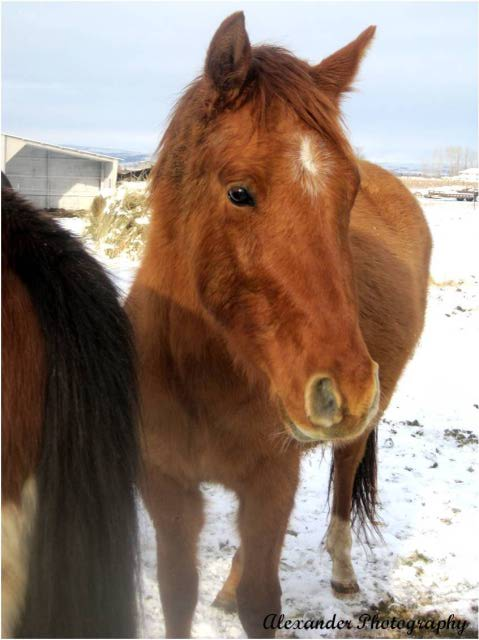 Colt Refuses to be Caught
Question
Spartan
Hi,
I have a 2 year old colt n
Colt Refuses to be Caught
Question
Spartan
Hi,
I have a 2 year old colt n
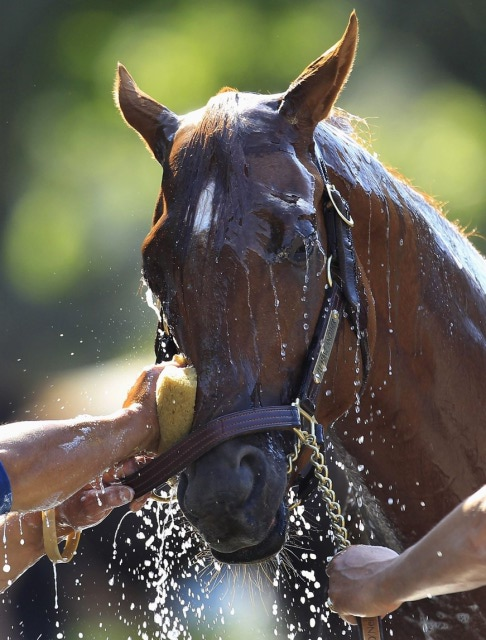 washing horse face softly
Question
washing horse face
hello maam, i believ
washing horse face softly
Question
washing horse face
hello maam, i believ
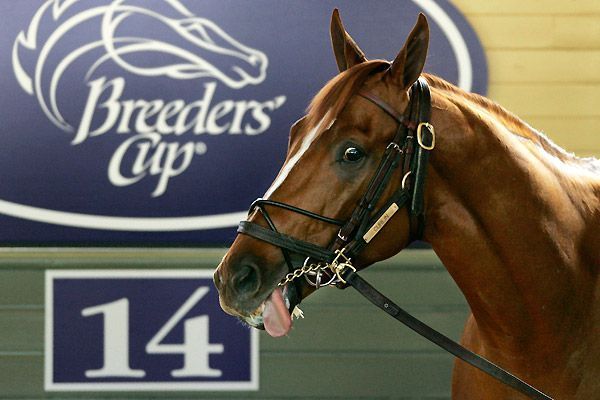 horse sticking its tongue out
Question
horse sticking its ton
hello sir, may i know w
horse sticking its tongue out
Question
horse sticking its ton
hello sir, may i know w
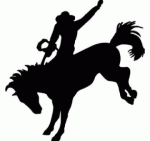 breaking a yearling
Question
breaking yearling
hello. may i know why cow bo
breaking a yearling
Question
breaking yearling
hello. may i know why cow bo
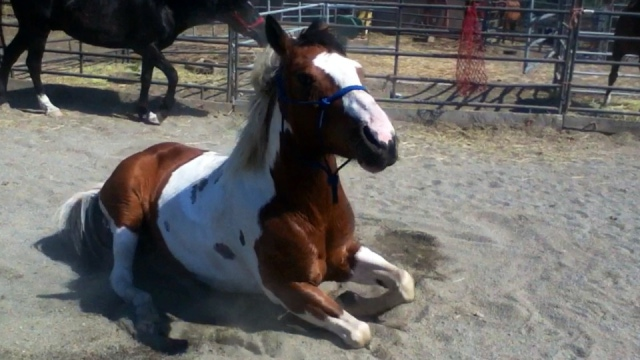 help me
Question
spicer spicer
im kayla and i hav
help me
Question
spicer spicer
im kayla and i hav